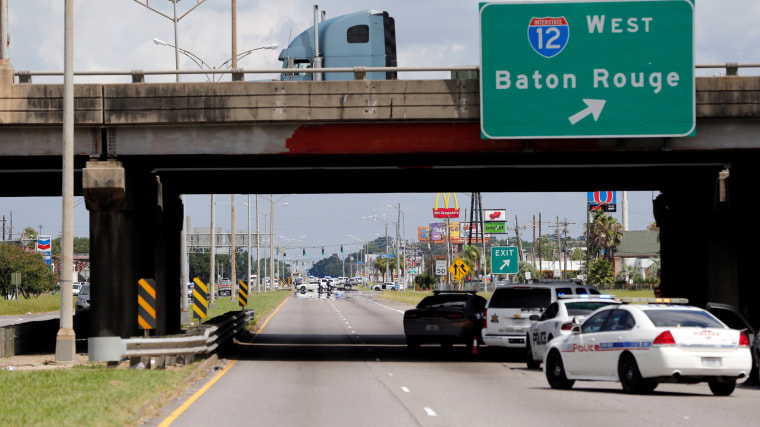Details are still emerging after yesterday's murders in Baton Rouge, where a gunman killed three police officers. As of this morning, it appears the killer acted alone and did not use a 911 call to lure the officers into an ambush.
NBC News' report noted overnight, "Law enforcement officials initially believed that two other suspects were at large, but later said the deceased suspect was likely the only shooter."
The gut-wrenching murders would be tragic under any circumstances, but the fact that the Baton Rouge slayings come on the heels of last week's police shooting in Dallas only intensifies the scope and scale of the heartbreak.
What's more, this violence is unfolding against a political backdrop of a presidential campaign and the start of the Republican National Convention, which kicks off today in Cleveland. Yesterday's shootings prompted a variety of U.S. political leaders to respond in competing ways -- and the differences between them matter.
President Obama, for example, condemned the attack, extended his support to the community and law enforcement, and called for unity and calm. Similarly, Hillary Clinton explained that there is "no justification for violence, for hate, for attacks on men and women who put their lives on the line every day in service of our families and communities." She called for Americans to "stand together to reject violence and strengthen our communities."
And there was Donald Trump.
"We grieve for the officers killed in Baton Rouge today. How many law enforcement and people have to die because of a lack of leadership in our country? We demand law and order."
So, let me get this straight. A madman killed three police officers because of national "leadership," which the Republican presidential hopeful believes he can address with a '60s-era slogan and a policy matter he knows nothing about.
On Twitter, the GOP candidate added, soon after the president urged Americans to stand together, "President Obama just had a news conference, but he doesn't have a clue. Our country is a divided crime scene, and it will only get worse!"
I've read this a few times, and I'm still not sure what "divided crime scene" means, exactly. If we elect Trump, is he promising to create a united crime scene?
This morning on Fox News, Trump went on to say that he sees something more nefarious coming from the White House: Obama's rhetoric about law enforcement is "OK," Trump said, but the president's body language suggests "there's something going on."
Remember, in less than four months, tens of millions of Americans will head to the polls, and a whole lot of then will support making this man the leader of the free world.
More broadly, comparing the reactions to yesterday's killings in Baton Rouge helps bring the entire election season into focus. Clinton called for unity; Trump emphasized division. Clinton chose to aim high; Trump aimed for the gutter.
This keeps happening. It's not an accident; it's emblematic of who Donald J. Trump really is.
I'm reminded of something the Washington Post's Greg Sargent said last week: "With many political observers and commentators wringing their hands about the failure of Donald Trump and Hillary Clinton to unite the country in the wake of police killings in both directions ... we should be pointing out that one of the two candidates is actively trying to divide the country, while the other just isn't."
And by any sensible measure, that's just not normal. Even if we put aside the oddity of a major political party nominating a television personality who relies on overt racism to lead a presidential ticket, Americans aren't generally confronted with national candidates who, quite deliberately, see value in dividing the country.
Even when they don't mean it, presidential hopefuls have traditionally maintained the pretense that unity is preferable to division, and bringing people together is better than tearing them apart. Even George W. Bush, you'll recall, spent months insisting he's a "uniter, not a divider."
Trump has no use for such niceties. He seems to believe there's value in tearing the country in half -- just so long as he's left with the bigger chunk.
